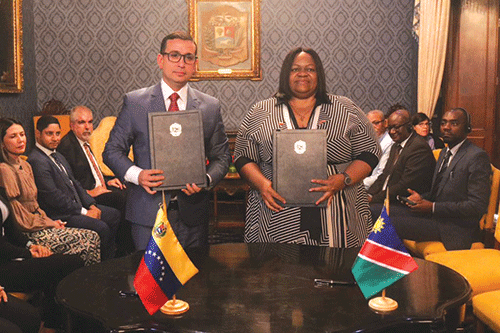Elijah Mukubonda
The Ministry of Industrialisation and Trade is tasked with enhancing sustainable social and economic development by creating an enabling environment for the benefit of all citizens. This is carried out through creating enabling policies, legislation and strategies to facilitate the ease of doing business, promotion of investments, creation of industries, support of small businesses, and expanding and developing export markets and products.
The ministry works in tandem with a host of other stakeholders in both the public and private sector, with programmes geared towards the realisation of national socio-economic development goals of our country to address essential objectives such as high and sustained economic growth, employment-creation and increased income equality. The ministry is also cognisant of the priority status that sectors such as logistics, tourism, manufacturing and agriculture should enjoy if Namibia is to become industrialised with a knowledge-based society by the year 2030.
The ministry continues to improve the quality of the mandate assigned as a pioneer for economic growth of the country. Hence, it contrives the formulation and implementation of appropriate policies, legislation and strategies to promote investment, increase trade, and grow industrialisation implanted in the “Growth at Home” strategy. The 2023/24 period observed tremendous progress in the implementation of the key programmes aimed at contributing to the economy and job-creation.
Legislation & policy
The policy aspect aims to strengthen the ministry’s mandate in terms of industrialisation, investment and trade development. Apart from reaching out to international entities to attract Foreign Direct Investment (FDI) to grow our economy, the ministry also reached out to other countries to share and learn more about best-practices. The 2023/24 period witnessed a gradual drive to enhance the industrial sector; promote investment through the requisite legal and regulatory building blocks to fully industrialise Namibia; to strengthen its trade both locally, regionally, continentally and globally; and to vigorously enable small and medium enterprises to develop and flourish.
Notable milestones:
The ministry facilitated the enactment and promulgation of the Metrology Act, which provides legal units of measurement and legal metrology, technical regulations, national measurement standards, and ensures compatibility to international measurement standards. The Act designates the Namibia Standards Institution (NSI) as the head of metrology in Namibia, and repealed the Trade Metrology Act of 1973 and its amendments;
The Property Practitioners Bill, which will repeal the Namibia Estates Agents Act, is at an advanced stage;
The Competition Bill is also in its final stages, and will be aligned to the National Competition Policy 2020-2025;
The Namibia Investment Promotion and Facilitation Bill is expected to be promulgated, and encompasses the treatment and support for domestic and foreign investors. It provides for sector reservations for Namibian investors.
Drafted publications:
National Informal Economy, Start-ups and Entrepreneurship Development Policy to support enterprise development and foster an entrepreneurial culture in the particular segments of the business sector;
Sustainable Special Economic Zone Bill built on the 2022-2027 National Policy Sustainable Special Economic Zones Policy;
Asociated Accompanying Regulations for the SSEZ Bill that provides the outlay of operational modalities for the envisaged Namibian Special Economic Zones regime; Sustainable Special Economic Zones sectoral incentives that build on the basic incentive regime outlined in the SSEZ Policy of 2022-2027; andNational Cooling Strategy that ensures the development, promotion and regulations of the heating, ventilation, refrigeration and air-conditioning (HVAC) sectors under the ministry’s National Ozone unit.
Other Industrialisation and Trade initiatives
The establishment of the African Continental Free Trade Area (AfCFTA), the ministry continued to enhance access to economic opportunities for the youth at national and regional levels through sustainability in youth priority sectors. Participated at continental pedestal to accelerate the implementation of the AfCFTA, and activate trade and investment activities. The key objective of the AfCFTA is to boost intra-African trade, designed to achieve a single continental market. Namibia continues to ready herself to tap into a single market of about 1.3 billion people, while growing at home and industrialising the local economy to produce goods and services with which to trade. On the SADC front, through Namibia’s ratification of the Montreal Protocol of 1987, Namibia was nominated to be the headquarters of the SADC Refrigerator and Air-Conditioning Association. This consolidates Namibia’s ambition of becoming a Green Hydrogen hub. To this end, the National Cooling Strategy is to be tabled during the accounting period. Namibia is ready to steer pivotal matters on industrialisation to enable trade and commerce for the landlocked neighbours within the region.
Strategy and Structure
The Special Economic Zone Policy was approved by Cabinet, enabling the ministry to develop the legal frameworks around the Special Economic Zones (SEZ).
Namibia benchmarked its Industrial policy implementation framework against best regional and international practices, and to facilitate knowledge- sharing among national and international experts with the ultimate view of providing technical input to government with regard to processes and instruments for effective industrial policy implementation.
An industrial policy framework and strategy does ensure increased value-addition and the sustainable growth of our country.
MoU and Agreements
The Bolivarian Republic of Venezuela and the Republic of Namibia signed a Memorandum of Understanding (MoU) on Trade and Economic Cooperation as a glowing testimony to fortify bilateral ties between the two countries. Entering into this MoU with Venezuela benefits Namibia through economic intelligence/information exchange, the development and exploitation of trade, industrial cooperation, and investment opportunities. The two countries have signed about 22 cooperation instruments in politics, education, culture, library services, communication, mining, oil, agriculture, housing, women and gender equality, electoral processes, work and social development.
Namibia and Russia signed an agreement to cooperate in the fields of aviation; ship-building; metallurgy; chemical industries; transport and special machinery; and light industry, among others.
*Elijah Mukubonda is chief information officer at the trade and industrialisation ministry.


